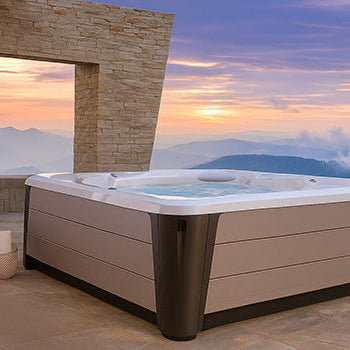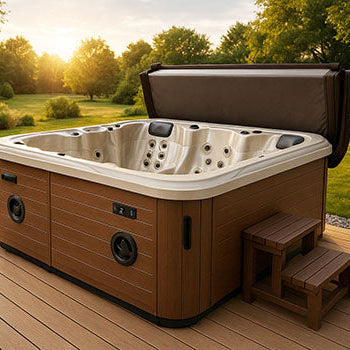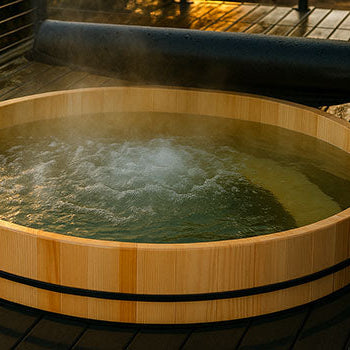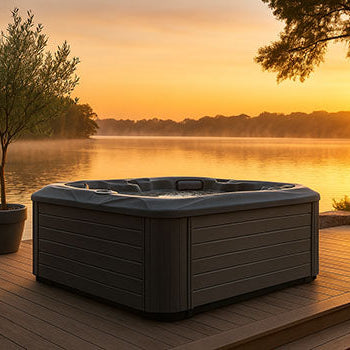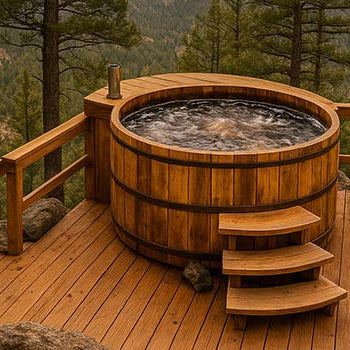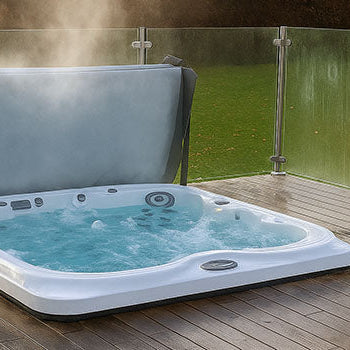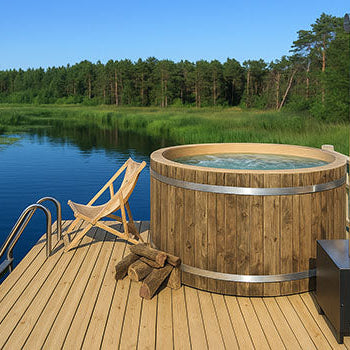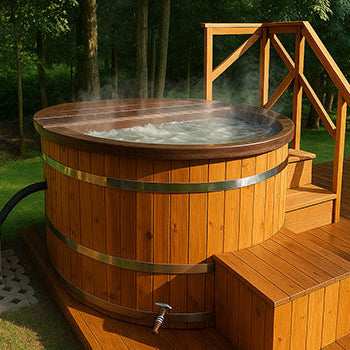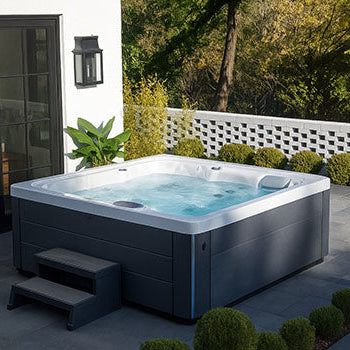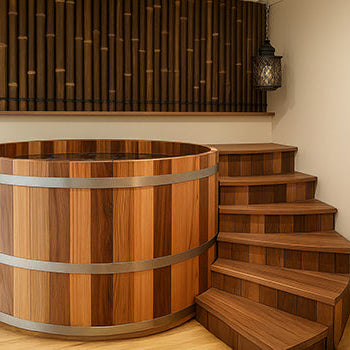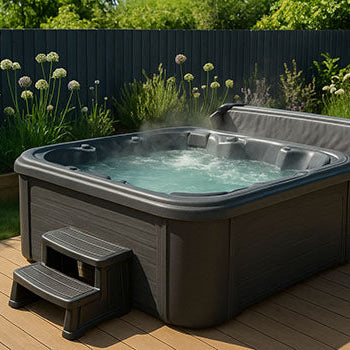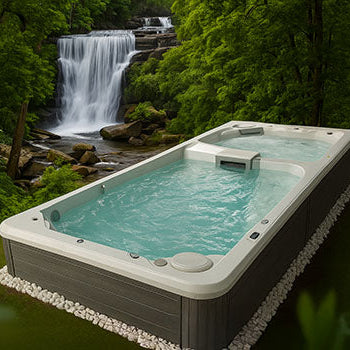Are hot tubs bad for your heart?
Short answer: not always, but they can be if you're not careful.
It depends on your health, water temperature, and how long you’re soaking.
That cosy Acrylic Hot Tub in your garden might look inviting, and Wooden Hot Tubs have rustic charm, but your heart doesn't care how stylish they are.
Even the durable Rotomoulded tubs can be risky if your heart isn’t in tip-top shape.
So before you sink into a steamy paradise, here's what your heart wants you to know first.

How Hot Tubs Affect Your Cardiovascular System
Vasodilation: Widening Blood Vessels Due to Heat
When you step into a hot tub, your body reacts quickly to the heat. One of the first things that happens is vasodilation, your blood vessels expand to help release excess heat. While this natural cooling response helps regulate temperature, it also means your cardiovascular system has to work harder to maintain balance. For individuals with heart concerns, this extra effort could pose challenges.
Impact on Blood Pressure (Potential Drop)
As your blood vessels widen, blood pressure may drop rapidly. While that can feel soothing at first, it might catch up with you when you stand up and suddenly feel dizzy or unsteady. This drop is particularly risky for people with low blood pressure, as it could lead to light-headedness or even fainting. That’s why it’s important to rise slowly and with caution after a soak.
Increase in Heart Rate to Compensate
To counterbalance falling blood pressure, your heart kicks into gear by increasing its rate. This reaction helps ensure vital organs keep receiving enough blood. For most people, this mild increase in heart rate is manageable. However, for anyone with an existing heart condition, this extra strain could be problematic, turning a relaxing soak into a risky situation.
Changes in Blood Circulation
Hot water encourages blood to shift toward the skin as part of your body’s effort to cool down. While this might seem harmless, it also means that less blood is reaching internal organs and muscles. For people with heart disease, that change in circulation can lead to uncomfortable or even dangerous symptoms. It’s important to monitor how your body responds during and after your time in the tub.
Potential Risks for Individuals with Heart Conditions
Increased Strain on the Heart Muscle
Although soaking in a hot tub may feel effortless, your heart is doing extra work behind the scenes. Extended exposure to heat increases cardiovascular demand, which can lead to breathlessness or discomfort, especially in those with weakened heart muscles. It's a quiet stressor, one that may not be obvious until it's already taken a toll.
Risk of Exacerbating Arrhythmias (Irregular Heartbeats)
If you already experience irregular heartbeats, a hot tub could intensify those symptoms. Elevated body temperature and cardiovascular stress can disrupt your heart's rhythm further. Experiencing skipped beats, palpitations, or a racing heart during or after a soak is a clear signal to exit the tub and rest, and potentially seek medical advice.
Potential for Dangerous Drops in Blood Pressure (Hypotension)
For people susceptible to low blood pressure, even brief time in a hot tub can cause a sudden and steep drop. This can result in weakness, dizziness, or even passing out. It’s not just an inconvenience, it can be dangerous, especially if you're alone or in a vulnerable position. Taking precautions or limiting hot tub use is often the safest route.
Risk of Dizziness, Fainting, or Chest Pain
Feeling dizzy or faint in a hot tub is more than just a minor side effect, it could be your body signaling that it’s under too much strain. Chest pain is an even more urgent red flag. These symptoms should never be ignored. If they appear, exit the water immediately and seek medical advice, especially if the effects persist.
Interactions with Heart Medications (e.g., Beta-Blockers, Diuretics)
Certain heart medications, such as beta-blockers or diuretics, can alter how your body handles heat and fluid balance. When combined with the effects of a hot tub, they may impair your body’s ability to regulate itself properly. This increases the risk of dehydration, overheating, or blood pressure changes. Always consult your doctor about how your specific medications may interact with hot tub use.
Specific Heart Conditions Requiring Caution
Coronary Artery Disease (CAD)
People with CAD have narrowed arteries that already struggle to deliver enough oxygen to the heart. Adding heat into the equation increases demand on the heart without improving supply, which can lead to chest pain or other complications. While a hot soak might seem soothing, it can be deceptively dangerous without medical clearance.
Congestive Heart Failure (CHF)
In CHF, the heart’s ability to pump efficiently is already compromised. When hot water increases blood flow to the skin, the heart can become overwhelmed. This can worsen symptoms such as swelling, fatigue, or breathing difficulty. Anyone with CHF should be extremely cautious, and only use hot tubs with their doctor’s explicit approval, and for short durations.
High Blood Pressure (Hypertension) – Controlled vs. Uncontrolled
If your hypertension is well-managed, using a hot tub in moderation may be acceptable. However, if your blood pressure is uncontrolled, the additional stress from heat can make things unpredictable. Your blood pressure could spike, or drop dangerously. Always consult your doctor before soaking, and if approved, stick to short sessions and moderate temperatures.
Low Blood Pressure (Hypotension)
Those prone to low blood pressure need to be especially careful. Hot water causes blood vessels to dilate further, compounding the issue and potentially leading to fainting. It’s best to avoid long soaks, stay hydrated, and remain seated during and after your session to avoid sudden drops in pressure.
History of Stroke or Heart Attack
If you’ve previously experienced a stroke or heart attack, your cardiovascular system may be more sensitive to temperature changes. The stress of hot water immersion could potentially trigger another event, especially if vessel damage still exists. Always get your cardiologist’s approval before using a hot tub, and err on the side of caution even if cleared.

The Absolute Necessity of Medical Consultation
Why You MUST Speak to Your GP or Cardiologist Before Using a Hot Tub if You Have a Heart Condition
This isn’t about being overly cautious, it’s about making informed, safe decisions. Your GP or cardiologist understands your personal health history far better than any general advice online. Even if you feel perfectly fine, your cardiovascular system may respond unpredictably to heat exposure. A quick medical consultation can prevent serious complications, and possibly keep you out of the hospital.
Discussing Your Specific Condition and Medications
Every heart condition and medication affects your body differently. Some drugs interact poorly with heat, while certain diagnoses increase sensitivity to temperature changes. Your doctor can offer guidance tailored to your situation, recommending whether hot tub use is appropriate and under what conditions. Think of it as a personalised safety plan, designed just for you.
Receiving Personalised Advice on Safe Use (If Permitted)
If you get the green light to enjoy a hot tub, your doctor won’t stop there, they’ll help you do it safely. Expect advice on ideal soak durations, safe water temperatures, and hydration tips. These recommendations ensure your experience stays relaxing, not risky. With expert guidance, you can enjoy the benefits without worrying about your heart health.
Potential Cardiovascular Benefits for Healthy Individuals?
Temporary Improvement in Circulation
For those with no underlying heart issues, hot tubs may offer mild circulatory benefits. The warmth helps blood vessels dilate, improving blood flow and relieving muscle tension. This temporary boost can leave you feeling refreshed and physically relaxed, just be mindful not to overstay your welcome in the heat.
Stress Reduction Benefits for Heart Health
There’s a reason that first dip feels so satisfying. The calming effects of warm water can help reduce stress levels, and that’s great news for your heart. Lower stress often means lower blood pressure and better sleep, both crucial for cardiovascular wellness. Managing stress is an underrated way to support long-term heart health.
Passive Heating Effects (Minor Cardiovascular Workout)
Hot tubs can slightly elevate your heart rate, much like light exercise. This passive cardiovascular stimulation can be especially helpful for those with limited mobility. While it’s not a replacement for physical activity, it can complement your heart-healthy routine. Still, check with your doctor before relying on it for benefits.
Safe Usage Tips If Medically Approved
Moderate Water Temperatures
Keep water temperatures between 37°C and 38°C to stay within a safe and effective range. Higher temperatures may feel luxurious but can increase cardiovascular strain. Remember: more heat doesn’t mean more benefit, so listen to your body, not just the thermostat.
Shorter Soak Durations
15 to 20 minutes is plenty. Anything longer can increase the risk of dizziness, fatigue, or overheating. A timer can help you enjoy the moment safely without overdoing it. Longer doesn’t mean better when it comes to hot tubs.
Avoiding Alcohol
Skip the alcohol when soaking. Hot water and booze both lower blood pressure and slow reflexes, making them a risky combination. To keep things safe, stay sober and stay sharp while in the tub.
Gradual Entry and Exit
Take it slow. Ease into the hot tub and exit even slower. Sudden movement can cause a rapid drop in blood pressure, leading to dizziness or fainting. Use the rails if needed, and move deliberately. A graceful exit is safer than a stumble.

Conclusion: Hot Tubs Can Pose Risks for Heart Patients; Medical Advice is Essential
Hot tubs feel amazing, but your heart might not always agree. The heat affects your blood flow, blood pressure, and heart rate. For some people, these changes are harmless. But for others, especially those with heart conditions or who take medications, these shifts can be potentially risky. That’s why it’s essential to consult your GP before hopping in.
Whether you prefer glossy Acrylic Hot Tubs, rustic Wooden models, or durable Rotomoulded options, the type of tub doesn’t change the health considerations. What truly matters is how your body responds to heat.
So remember to soak smart, stay alert, and always prioritise your heart health. Because at the end of the day, a safe soak is the best soak.
